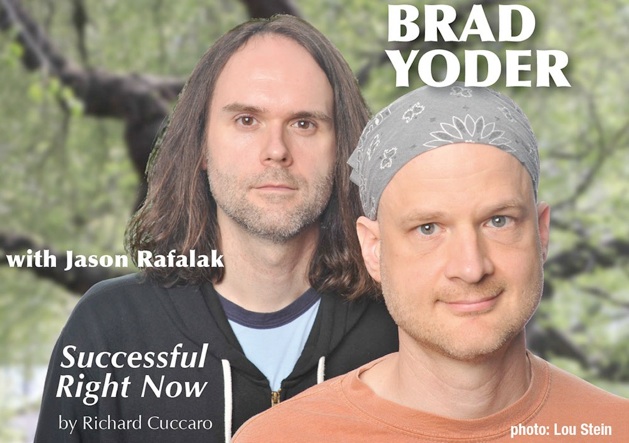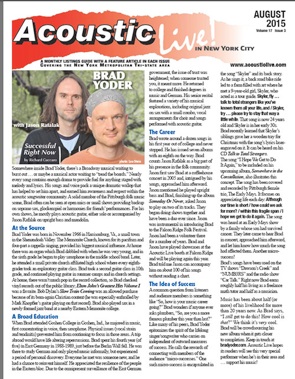Somewhere inside Brad Yoder, there’s a Broadway musical waiting to burst out … or maybe a musical actor waiting to “tread the boards.” Nearly every song contains enough drama to provide fuel for anything staged with melody and lyrics. His songs and voice pack a unique dramatic wallop that has helped to set him apart, and earned him awareness and respect within the acoustic songwriter community. A solid member of the Pittsburgh folk music scene, Brad often can be seen at open mics or small shows providing backup on soprano sax, glockenspiel or harmonies for friends’ performances. For his own shows, he mostly plays acoustic guitar, either solo or accompanied by Jason Rafalak on upright bass and mandolin.
At the Source
Brad Yoder was born in November 1966 in Harrisonburg, Va., a small town in the Shenandoah Valley. The Mennonite Church, known for its pacifism and four-part a cappella singing, provided his biggest musical influence. At home there was an organ which Brad dabbled with when he was very young, and in the sixth grade he began to play saxophone in the middle school band. Later, he attended a small private church affiliated high school where every eighth-grader took an exploratory guitar class. Brad took a second guitar class in 10th grade, and continued playing guitar in summer camps and in church settings.
At home, there wasn’t much pop in the record collection, so Brad checked vinyl records out of the public library; Elton John’s Greatest Hits Volume I was a favorite. Bob Dylan’s Slow Train Coming was an allowed purchase because of its born-again Christian content (he was especially enthralled by Mark Knopfler’s guitar playing on that record). Brad also played sax in a newly formed jazz band at a nearby Eastern Mennonite college.
A Broad Education
When Brad attended Goshen College in Goshen, Ind., he majored in music, first concentrating in voice, then saxophone. Physical issues (vocal strain and tendinitis) prevented him from continuing to focus in those areas. A trip abroad would have life altering repercussions. Brad spent his fourth year (of five) in East Germany in 1988-1989, just before the Berlin Wall fell. He was there to study German and only played music informally, but experienced a period of personal discovery. Everyone he met was someone new, and he had a chance to reinvent himself. He appreciated the resilience of the people in the Eastern bloc. Due to the omnipresent surveillance of the East German government, the issue of trust was heightened; when someone trusted you, it meant more. He returned to college and finished degrees in music and German. His senior recital featured a variety of his musical explorations, including original jazz on sax with a small combo, vocal arrangements for choir and songs performed with acoustic guitar.
The Career
Brad wrote around a dozen songs in his first year out of college and never stopped. He has issued seven albums with an eighth on the way. Brad counts Jason Rafalak as a big part of his presence in the folk community. Jason first saw Brad at a coffeehouse concert in 2005 and, intrigued by his songs, approached him afterward. Jason mentioned he played upright bass and Brad, finishing up the album Someday Or Never, asked Jason to play on two of its tracks. They began doing shows together and have been a duo ever since. Jason was instrumental in introducing Brad to the Falcon Ridge Folk Festival. Jason had been a volunteer there for a number of years. Brad and Jason have played showcases at the Acoustic Live booth at Falcon Ridge and will be playing again this year. Brad told me Jason can accompany him on about 100 of his songs without reading a chart.
The Idea of Success
A common question from listeners and audience members is something like “So, how is your music career going?” Brad wonders if anyone ever asks plumbers, “So, are you a more famous plumber this year than last?” Like many of his peers, Brad Yoder epitomizes the spirit of the lifelong singer/songwriter who carries on independent of outward measures of success. He calls the rewards of connecting with members of the audience “micro-successes.” One such micro-success is encapsulated in the song “Skyler” and its back story. As he sings it, a back road bike ride led to a farm filled with art where he met a 9-year-old girl, Skyler, who acted as a tour guide. Skyler, fly … talk to total strangers like you’ve known them all your life, and / Skyler, try … please try to stay that way a little while. That song is now 24 years old and Skyler is in her early 30s. Brad recently learned that Skyler’s siblings gave her a wooden tray for Christmas with the song’s lyrics laser-engraved on it. It can be heard on his CD Talk to Total Strangers.
The song “I Hope We Get to Do It Again,” to be included on his upcoming album, Somewhere in the Constellation, also illustrates this concept. The song has been covered and recorded by Pittsburgh female trio, The Early Mays. It focuses on appreciating life each day: Although our time is short / how could we ask for more? / within this fragile span / I hope we get to do it again. The song was heard at an Early Mays show by a family whose son had survived cancer. They later came to hear Brad in concert, approached him afterward, and let him know how much the song had affected them. Another micro-success!
Brad’s songs have been used on the TV shows “Dawson’s Creek” and “NUMB3RS” and the radio show “Car Talk.” Right now Brad earns roughly half his living as a freelance math tutor and half as a musician.
Music has been about half (or more) of his livelihood for more than 20 years now. As Brad says, “I still get to do this! How cool is that?” We think it’s very cool.
Brad will be crowdsourcing his new album when it gets closer to completion. Keep in touch at bradyoder.com. Acoustic Live hopes its readers will see this very special performer when he’s in their area and … support his music!


